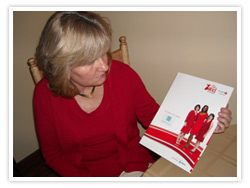 Manage your Game Plan
Manage your Game Plan
1.) First and foremost “NOTHING SLIPS THOUGH THE CRACKS” are words to live by at the hospital and beyond. The family must make sure that the stroke patient is covered 24/7 because of all the tests and procedures that you will be going through. You will find lack of communication at the hospital. Don’t ever assume that the lab personnel or your primary physician knows what has transpired over the last several days and do what you have to do for your loved one. You control you destiny. Thus, don't be afraid to question anyone in the process.
2.) TREAT THE PROBLEM - Barb’s career was primarily in the sports medicine treatment not in neurological rehab. There is a big difference between the two, although there are many applications that are similar. What Barb learned early is that you “have to treat the problem” not the symptoms. You may look or feel that your arm and leg are broken but they’re not. It is the signals from the brain that aren’t allowing them to fire as you would like.
3.) BE POSITIVE - and provide positive feedback to your loved one. You are going to get through the tough times! Don’t ever give up. Focus on what is good in your life not the negative stuff. The non-affected spouse and family must be cheerleaders!
4.) TAKE CARE OF YOURSELF - Strokes are an overwhelming experience for everyone that is involved. It is imperative that you take care of yourself (non-affected spouse) so that you can take care of others. Through this event you may lose faith in your primary care doctor or other medical professionals. If that is the case, find another one that can help the equation and with whom you are comfortable. Second opinions are not a bad thing and can assist in validating tough decisions down the road.
Combining Therapies- Time Management
When dealing with hemiplegic (one entire side of the body has some paralysis) rehab and severe Apraxia and Aphasia on the speech side, you have a lot of time demands on the therapy front. Realistically, all the various exercises that will be prescribed for you to do daily from PT’s, OT’s, speech therapists and doctors will be extremely difficult to complete to their satisfaction.
Barb has found a unique way to combine therapies that allow her to make progress in all fronts. She utilizes the exercise that works both arms, legs and provides cardiovascular exercise. This along with a short regimen of core muscle exercises and range of motion daily enables her to recover.
While on the exercise bike she does speech therapy with her assistant. This is a combination of cards, magazines and objects that she is able to respond to or discuss effectively.
After a year, Barb has created a new speech center for her language with supplemental cells in her brain. The foundation of her speech at this point is hundreds of words and phrases that are applicable to her life and daily activities. Most satisfying is singing along with familiar songs playing on the radio.
Baseline Management
You have to know where you’re at to understand where you’re going. This may sound simple but it is extremely important to the stroke recovery equation. Please push therapists and doctors to establish these ongoing baselines for you and the family in all areas that have been affected by the stroke through your recovery phase.
For example, Barb is requiring years of therapy because of her severe stroke. We feel that after the year we were at the 13-mile mark of our initial rehab marathon. Therefore, we committed to another year of ongoing therapy. This is not to say that maintenance for Barb and ongoing improvement will not be big part of her mission and home life for the future.
For this, a scorecard is kept to manage the process. Therapists are required to establish baselines continually on all fronts, along with Barb’s goals for the future.
Keeping Your JOB and Your family Intact
Unfortunately for some, bad stroke situations can destroy marriages and families. Additionally, many spouses may lose their jobs, others can go bankrupt, stroke victims are institutionalized, etc.
This doesn’t need to happen. Many give up on their situations too early. If you listen to any of our advice, you must “hang in there for the family.” Don’t give up. Your future is bright and will come into focus if you have the tenacity and persistence for this challenge. Trust us, you are more resilient that you think.
Avoid as much collateral damage as possible. An example of this would be to get your children doing what they used to do before the stroke that has affected Mom or Dad. Get the kids back to school or back to their work responsibilities as soon as possible. Obviously they care a great deal but they have their lives to lead as well. We suggest that they are involved in the rehab process but not consumed by this setback that has hit your family.
On the other hand, the finances and keeping jobs intact are major issues. Hopefully, your employer will give you some latitude to address specific rehabilitation needs for either spouse. It is imperative that you maintain family health benefits and that you are on top of these coverages. Unfortunately, many in this situation go bankrupt because of giving up jobs and benefits. You will be faced with potentially hundreds of thousands of dollars of medical bills that can be reimbursed with insurance coverage.
We are not painting a rosy picture here. The non-affected spouse has to prepare themselves to carry the financial burden for your family. Employers understand and should support your needs as long as you commit to the process and work hard on all fronts.


